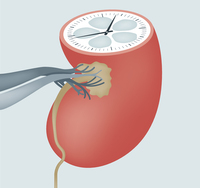The circadian clock is the body’s natural time-keeping mechanism, located in suprachiasmatic nucleus of the brain. It controls our circadian rhythms – changes to physical, mental and the behavioral processes that closely follows a 24-hour cycle.
In humans and in most other living things, the circadian rhythms primarily respond to the sunlight and to darkness. For example, at night time, the circadian clock tells the body it is the time to sleep by triggering an increase in the melatonin production.
How circadian clock in the kidneys plays a key role in the many of their functions.
 A key role of kidneys is to clear the waste products and excess fluids from blood. The kidneys contain millions of a nephrons, which are functional units that filters the blood. Any unwanted products are excreted from the body in the form of urine. Around 2 quarts of the fluid are removed from body through urination every 24 hours.
A key role of kidneys is to clear the waste products and excess fluids from blood. The kidneys contain millions of a nephrons, which are functional units that filters the blood. Any unwanted products are excreted from the body in the form of urine. Around 2 quarts of the fluid are removed from body through urination every 24 hours.
Kidney Clock Regulates Adaptation to Light-Dark Cycles
The kidney forms and excretes significantly more urine during the day, making it “one of most easily detectable rhythmic processes.” At least a part of this rhythmicity dependent on the circadian clock mechanism”.
The expression of gene in the kidneys called Bmal1, which play a crucial role in the organs’ circadian clock mechanism.
By doing so, the innate circadian clock regulates kidney’s ability to adapt to light and dark stages of the day that correlates with activity and rest. These adaptations play important role in the blood levels of amino acids, lipids and in other products.
The circadian clock in the kidneys is responsible for the eradicating drugs from the body. As such, this internal clock can affects how long a medication stays in the body and how effective it is.
